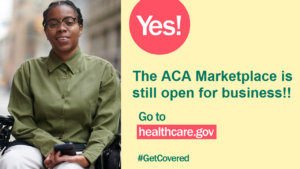 As Open Enrollment continues, we at AAHD wanted to take a look at the important impact that having healthcare coverage for people with disabilities can have, especially during a pandemic, when uncertainties are more common than ever before. Healthcare coverage provides access to care and leads to better health outcomes for individuals, providing an important sense of security for people with disabilities.
As Open Enrollment continues, we at AAHD wanted to take a look at the important impact that having healthcare coverage for people with disabilities can have, especially during a pandemic, when uncertainties are more common than ever before. Healthcare coverage provides access to care and leads to better health outcomes for individuals, providing an important sense of security for people with disabilities.
About 1 in 4 people in the United States have a disability, an important statistic to note when it comes to obtaining affordable and accessible healthcare coverage. Studies have shown that people with disabilities have more difficulty in getting preventative healthcare services necessary to lead a healthy life, which negatively impacts already marginalized groups:
Disability is the most common in these groups:
- 2 in 5 adults age 65 years and older
- 1 in 4 women
- 2 in 5 non-Hispanic American Indians/Alaska Natives
People with disabilities generally have more health issues than those who do not have a disability, as health issues become compounded. For instance, people with disabilities are:
- Over 30% more likely to be obese
- 60% more likely to smoke
- Over 2.5 times more likely to develop diabetes
- Over 3.5 times more likely to have cardiovascular disease (18-44 y.o.) and just under 3 times more likely to have cardiovascular disease (45-64 y.o.)
A person’s employment status impacts the accessibility and coverage for healthcare. As of 2019, the American Community Survey statistics on disability employment are as follows:
- 8 million people with a disability are employed
- 1 million are deaf or hard of hearing
- 7 million are blind or have low vision
- 7 million have a cognitive disability
- 4 million have a mobility disability
- 910,000 people with a disability who are in the workforce are unemployed
- 137,000 are deaf or hard of hearing
- 161,000 are blind or have low vision
- 517,000 have a cognitive disability
- 289,000 have a mobility disability
Those who do not have employer-based coverage or who cannot qualify for Medicaid can turn to marketplace plans, through healthcare.gov. Marketplace plans with available tax credits can provide affordable coverage for essential health benefits, pre-existing conditions, and preventative services.
Healthcare access barriers greatly affect adults with disabilities, with the lack of coverage/accessibility leading to inadequate health outcomes. Healthcare access barriers for adults with disabilities include:
- 1 in 3 that do not have a primary healthcare provider
- 1 in 3 that have unmet healthcare needs due to the cost in the last year
- 1 in 4 that did not have a routine check-up in the last year
- 40% are not able to get needed care due to health plans not approving/covering/paying for coverage
Sources:
- Center for Disease Control and Prevention, 2021; Disability Impacts All of Us. Retrieved from https://www.cdc.gov/ncbddd/disabilityandhealth/infographic-disability-impacts-all.html
- Centers for Medicare and Medicaid Services, 2019; How Does Disability Affect Access to Health Care for Dual Eligible Beneficiaries? Data Highlight No. 17. Retrieved from https://www.cms.gov/About-CMS/Agency-Information/OMH/Downloads/Data-Highlight_How-Does-Disability-Affect-Access-to-Health-Care-for-Dual-Eligible-Beneficiaries.pdf
- Krahn, G.L., Walker, D.K., De-Araujo, R.C., 2015; Persons With Disabilities as an Unrecognized Health Disparity Population. American Journal of Public Health 105, S198_S206. Retrieved from https://doi.org/10.2105/AJPH.2014.302182
- United States Census Bureau, 2019. Employment Status By Disability Status and Type. Retrieved from https://data.census.gov/cedsci/table?t=Disability%3AEmployment%20and%20Labor%20Force%20Status&tid=ACSDT1Y2019.B18120&hidePreview=true
